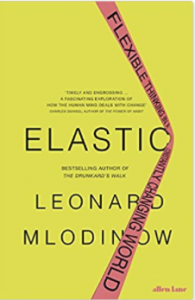
Elastic thinking


The world is changing faster now, in 1958 an average lifespan of a company was 60 years and now the lifespan is less than 20. Bestselling science writer Leonard Mlodinow, we are going to need less linear, logical analytic reasoning and more creative “elastic thinking”. We should be allowing more ideas to emerge bottom-up from the unconscious and organisations need less command and control and more involvement from across their membership.
As the Analytic and elastic minds constantly work together, Scientists often let ideas stew away in the unconscious and run with seemingly crazy ideas, but ultimately depend on their analytical reasoning skills to test and verify these ideas with both linear and non-linear thinking.
Mlodinow’s points out how the imaginative way in which Richard Feynman came up with his novel ideas about quantum theory after an encounter with Paul Dirac, but because maths backed it up that we still talk about it today.
Every chapter in his book starts with an anecdote or vignette. Tiring out your prefrontal cortex by making work hard frees up your creativity in much the same way as getting high or drunk does.
Mlodinow shows, the human brain is uniquely engineered to adapt and drawing on cutting-edge neuroscience and research, the flexible thinking has enabled some of the greatest artists and innovators to crate paradigm shifts. He also reveals how you can test your own brain power and increase your capacity for elastic thinking. By uncovering the secrets of our flexible minds, elastic explain how to thrive in an endlessly dynamic world, at a time when an ability to adapt is more important than ever before.
Elastic: Flexible Thinking in a Constantly Changing World by Leonard Mlodinow, Allen Lane £ 16.99/ Pantheon $27.95, 272 pages.
